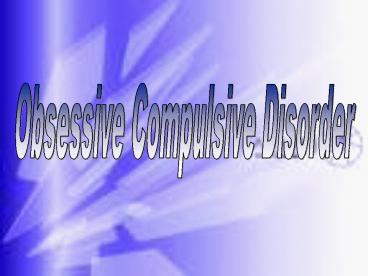Obsessive Compulsive Disorder - PowerPoint PPT Presentation
1 / 14
Title:
Obsessive Compulsive Disorder
Description:
A type of anxiety that happens when there is a problem with the way the brain ... Disgust with bodily waste or fluids. Concern with order, symmetry and exactness ... – PowerPoint PPT presentation
Number of Views:79
Avg rating:3.0/5.0
Title: Obsessive Compulsive Disorder
1
Obsessive Compulsive Disorder
2
What is OCD?
- A type of anxiety that happens when there is a
problem with the way the brain deals with normal
worrying and doubts - A person has recurrent and unwanted ideas or
impulses and an urge to do something to relieve
the discomfort caused by the obsession.
3
What are obsessions?
- Ideas, images, and impulses that run through the
persons mind over and over again. - Fear of dirt or germs
- Disgust with bodily waste or fluids
- Concern with order, symmetry and exactness
4
What are compulsions?
- Behaviors that people with OCD do to try to get
rid of nervous and afraid feelings according to
rules that they make up for themselves - Compulsions are also called rituals
5
What are common obsessions?
- Worrying that something has been done poorly when
they know it wasnt - Fear of thinking evil or sinful thoughts
- Thinking about certain sounds, images, words, or
numbers all the time
- Need for constant reassurance
- Fear of harming a family member or friend
6
What are common compulsions?
- Cleaning and grooming over and over again
- Checking drawers, door locks, and appliances to
make sure they are shut, locked, or turned off - Repeating things several times
- Ordering and arranging items in certain ways
- Counting over and over to a certain number
- Saving things such as newspapers, mail, or
containers when they are no longer needed - Seeking constant reassurance and approval
7
How common is OCD?
- It was thought to be rare for many years
- Recent studies show that as many as 3 million
Americans ages 18-54 may have it
8
What causes OCD?
- A single proven cause has not been found
- Research shows that it could have to do with
chemicals in the brain that carry messages from
one nerve cell to another - A person who has OCD may not have enough
Serotonin.
9
What other illnesses are associated with OCD?
- People often have other kinds of anxiety like
phobias or panic attacks - They may have depression, ADHD, and eating
disorder or a learning disorder such as dyslexia
10
How is OCD treated?
- Many medications are available clomipramine (
Anafranil), fluoxetine ( Prozac), sertraline
(Zoloft), paroxetine (Paxil), and fluvoxamine
(Luvox) - Behavioral therapy can also be used under the
guidance of a trained therapist
clomipramine
fluoxetine
sertraline
11
What are the risk factors of you getting OCD?
- the risk of you getting OCD is slightly higher if
your parents or other family members have OCD.
12
How do doctors diagnose OCD?
- There is no laboratory test to diagnose OCD but
your doctor may ask you questions about your
obsessions, compulsions, and emotional well-
being - Your doctor may also talk to your friends and
relatives about your behavior
13
Sources cited
- Obsessive Compulsive Disorder. ( 1995-2006).
On-line. Retrieved on December 7, 2006.
Available http//www.kidshealth.org/kid/health_pr
oblems/learning_problem/ocd.html - Obsessive Compulsive Disorder. ( 1995-2006).
On-line. Retrieved on December 7, 2006.
Available http//mentalhelp.net/poc/center_index.
php?id6
14
More sources
- Obsessive Compulsive Disorder What it is and how
to treat it. ( September 2006). On-line.
Retrieved on December 7, 2006. Available
http//familydoctor.org/133.xml - Obsessive Compulsive Disorder. ( October 4,
2006). On-line. Retrieved on December 7, 2006.
Available http//www.mayoclinic.com/health/obsess
ive-compulsive-disorder/DS00189































